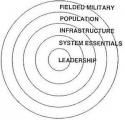I wanted to break these out of their respective threads because I think in the broader context we are talking about why and how change occurs, the advantages and disadvantages to change, and resistance to change. I saw both of these responses today and started thinking about their relationship:
Ken White said in post #33 in the Flawed Doctrine or Flawed Strategy thread
Bayonet Bryant said in Post #8 on the Changing the Army for Future Wars ThreadOur doctrine must support the elected strategy and if it does not, then new or altered doctrine should be developed to do that. Conversely, our strategy must not be constrained by current doctrine.
In my mind Ken’s quote from a thread that looks hard at establishing a cause and effect relationship, but the really interesting part of this I think is the last sentence “Conversely, our strategy must not be constrained by current doctrine. “ which gets to the first step of determining the objective or the policy end(s). I’m more of mind that History is contingent, and major shifts (aside from the geological type) don’t usually just occur regardless of how they wind up boiled and scripted in a linear historical narrative. They tend to be shaped by events, not all of which are rational, but in fact often appear to be based off of a torrent of information some of which is poorly informed, misinformed, partially informed, maybe even subject to being disinformed – its usually a combination of the good, the bad and the poor. I think getting the objective right is the critical piece because failing to get the objective right probably means starting off in the wrong direction.The first hurdle you need to make sure that you can clear is a justification of why the Army should be involved in nation-building in the first place. I'm not saying they should/shouldn't, just that you need to be very clear in your justification of why they should be. If you can't do that, then rest of it is a bit of a mental exercise, but little more.
Where I think Bayonet Bryant’s post ties in is wrt shaping the ways and means to pursue the objective. In this case the doctrine which would shape the rest of the DOTMLPF-P should follow articulated strategic guidance that in this case should signal a broad and enduring requirement(s), not a flash in the pan, brief episode, but one that recognizes an objective(s) which advances your sustained, long term security. You could argue that losing a war you have invested heavily in has long term effects on your security, or that given broader changes in your interests, or means and will to secure them; your objectives require a different approach. You could also argue the opposite, and in fact we have here on SWJ quite often. Much of this would seem to be subject to how you view the world, e.g. as an idealist or a realist, but even those terms are subject to politics and perspective.
On September 11th 2001 I was still in the field at Fort Lewis, WA. It was the last day of a training exercise for 1/25th Infantry and my BN 1-24th IN had just finished being the BDE’s OPFOR for the rest of the BDE (1-5 IN and 1-33 AR) as the they prepared for a JRTC rotation. During the week long FTX there was virtually no COBs (what was then referred to as civilians on the battlefield) and it was exclusively force on force. I was the BN Asst 3 and had been up all night; I was bagged out down the hill from the TOC. One of the RTOs came screaming down the hill telling me the CDR wanted me to get to the BN HQs as quickly as possible as there had been a radio call that we’d been attacked. What seemed impossible in that moment now looks much different. With a prognosis for “persistent conflict", long wars, etc and going on 8 years its hard to imagine otherwise. How does this affect our strategic outlook? Makes you empathize a bit with the decisions made by the Athenians and Spartans - but we've got a few decades to go to catch them I guess.
Looking forward I just can’t help but wonder about our desire to see things from a single perspective, and to try and make what by nature is uncontrolled into something that we can bend to our will, and build an objective to which it will seemingly self conform. Ken, no age reference inferred, but your comment would have found a good home in CvC’s work. It seems fairly straight forward and at first read, but is packed with complexity. I don’t know if you’ve read any William Carlos Williams, but he did one called “the Red Wheel Barrow” I think which is like that.
Best, Rob







 ) Sometimes, of course, they actually say something as does 3-24 and a few others. (I think pretty highly of FM 100-20 of 1990, for instance, but then I had something to do with it. Nothing in 3-24 contradicts anything we said in 100-20, just exapnds on it.)
) Sometimes, of course, they actually say something as does 3-24 and a few others. (I think pretty highly of FM 100-20 of 1990, for instance, but then I had something to do with it. Nothing in 3-24 contradicts anything we said in 100-20, just exapnds on it.)


Bookmarks